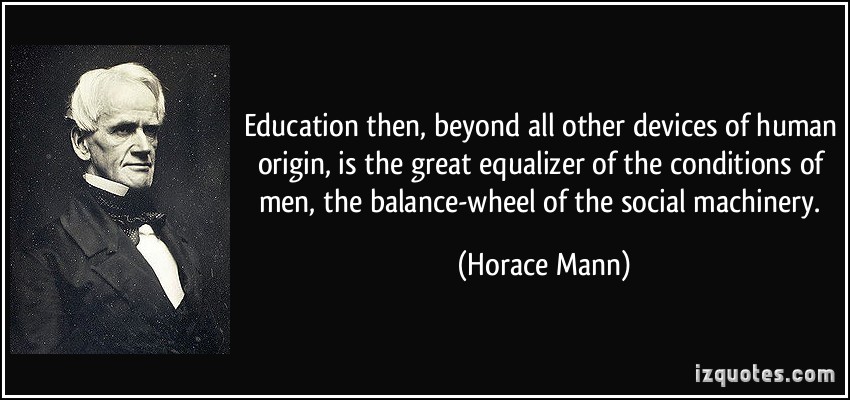
Most educators have had to study some version of the history of education as part of their teaching program in college. Most may remember, albeit dimly, Horace Mann, the creator of the Common School. What many may not remember is that while Mann believed firmly in the power of education to raise people out of poverty, his beliefs encompassed more than the mere acquisition of knowledge. One of the critical components of the Common School was the teaching of character.
Character, back in Mann’s day (the early 1800s), was based exclusively on the protestant Bible, and lessons from one of the mainstay texts of the time – the McGuffy Reader — made explicit reference to principles from the Bible. Stories from the Reader were designed to teach and reinforce various character skills: a willingness to obey, respect for elders, perseverance, resilience, learning from mistakes. As the U.S. became more diverse and other religious groups began to comprise more and more of the students being educated, this explicit link to the protestant Bible was deemed offensive and character education, which was so interwoven with it, became a casualty of its elimination from American public school classrooms. What took its place was a new focus on acquiring knowledge, a focus that became supremely important when the Soviet Union launched Sputnik in 1957 and the U.S. scrambled to reassert dominance in the Space Race. Skills in math and science and higher IQs were the new goal. Character education was simply not that important.
Except that, as it turns out, it was.
Hidden Brain‘s podcast “What’s Not on the Test” explores the effects of character education and the very real advantage these “non-cognitive skills” give to children both in the moment and long term. This interview with James Heckman (winner of the Nobel Prize for economics in 2000) discusses an interesting finding on the differences between those with high school diplomas and those who earned GEDs. Heckman found that GED earners had similar test scores to those who earned diplomas. From a purely cognitive standpoint, the GED program would appear to have been a success. But when Heckman looked at non-cognitive outcomes — income, incarceration rates, divorce rates, employment continuity — he found striking differences that were not in the GED-earner’s favor. If cognitive skills were essentially equal, what could account for these differences? What Heckman found was that the act of staying in school — delaying gratification, sticking it out, continuing to try — developed skills in the diploma-earners that translated to better outcomes in other areas of their lives. The high school graduates had something the GED-earners didn’t: Grit.
The podcast touches on an idea that Heckman says allows us to excuse ourselves from teaching certain skills: the idea that character traits are innate, that abilities are “gifts” rather than the product of many hours of applied practice, that discoveries are the product of inspiration rather than many hours of thought or labor. Remember Outliers and the 10,000 Hour Rule? (it wouldn’t be a post if I didn’t mention Malcolm Gladwell. He is my spirit animal.) Talent has to be refined and developed and that takes grit. It also takes teachers who recognize that students must try and try and try; that failure is an opportunity to teach resilience and perseverance. And the teacher, as well as the student, must come back again and again to build ability. Teachers who walk away from a student because they just “don’t have what it takes” are lacking in grit as well, consigning ability to something inborn rather than believing that these are skills which can be taught. Some teachers give up before they even enter the classroom because they subscribe to a worldview in which “those kids” are never going to get it (whoever “those kids” might be).
The most fascinating part of the podcast is the examination of a preschool program from the late 1960s. The program was designed to try to raise IQ scores in impoverished children. I’m not going to try to describe it here other than to say that it sounds lovely and contained several things which are near and dear to our hearts here at CMSi like project-based learning and hands-on, real world experiences. When they measured the results at age 10 or so, they found that the IQ scores weren’t any different than those in the control group. The program was a failure.
But….
Heckman tracked down the original participants (who are now in their 50s) and found something astonishing. The children in the original program, who participated 2 hours a day, 5 days a week, 42 weeks a year when they were 3 and 4 years old were far more likely to be in stable families and jobs, to be earning steady incomes, and to be providing stable, nurturing environments for their own children. They were healthier, too. Cognitively, the program was a bust, but in a number of other metrics it was a rousing success, with effects that lasted for decades and spanned generations.
Heckman, who is an economist after all, calculated the return on investment for a program such as this at 14%, which he points out is much higher than most public policy programs. Unfortunately, the returns are far in the future and therefore not of much interest to politicians with an eye to reelection.
Mann’s initial vision for education turned out to be spot on: character education is a critical component in equalizing the “conditions of men.” Listen to Hidden Brain on your PC here or wherever you get your podcasts.
